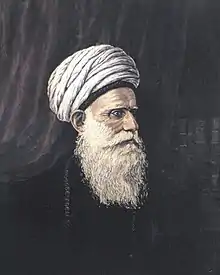Ahmad Huseynzadeh | |
|---|---|
 Portrait by Ali bey Huseynzade, 1900 | |
| Title | Third Sheikh ul-Islam of the Caucasus |
| Personal | |
| Born | 1812 |
| Died | December 17, 1887 (aged 74–75) |
| Religion | Islam |
| School | Shia |
| Muslim leader | |
| Based in | Tbilisi, Russian Empire |
| Period in office | 15 October 1852-1884 |
| Predecessor | Fazil Iravani |
| Successor | Mirza Hasan Tahirzadeh |
| Post | Sheikh ul-Islam of the Caucasus |
Ahmad Huseinzadeh (Azerbaijani: Əhməd Hüseynzadə) also known as Sheikh Ahmad Salyani[1][2] — third Sheikh ul-Islam of the Caucasus, maternal grandfather of Ali bey Huseynzade.
Early life
He was born in Salyan in 1812 to Ali Huseynzadeh.[3] He was brought up initially from 1822 to 1832 in his hometown by his uncle Akhund Molla Muhammad Hussein.[4] Then he became a student of the Baku mujtahid Akhund Molla Ramazan, and studied with him for another six years, until 1838 when he completed the full course of Arabic sciences.[4]
Career
After graduation he returned to Salyan in 1839 and started teaching various subjects to local children for 6 years. He was later gained higher religious education in Najaf and Tbilisi. He was appointed as Sheikh ul-Islam by Alexander II of Russia after Fazil Iravani's resignation with a monthly pension of 1600 rubles on 15 October 1852. He was appointed as head of Spiritual Council of Transcaucasian Shia Muslims, 5 April 1875. His deputy was Akhund Mustafa Talibzadeh, father of Abdulla Shaig. He was described as a rather liberal thinking cleric by Fatali Akhundzadeh[5] and contributed to Akinchi, first Azerbaijani language newspaper.[3] In his letter to Akhundzadeh in 1862, Yousuf Khan Mostashar al-Dowleh said of Huseinzadeh "I don't even consider him a mullah, but rather a spiritual cleric." Like Akhundzadeh, he was a promoter of Latin alphabet for Azerbaijani, defended the idea that it is not incompatible with Sharia and Islam.[6][3]
He resigned in 1884 and lived in Tbilisi where he died 3 years later.
Family
He was married to the daughter of his uncle Mahammad Ali Huseynzadeh,[4] Husniyya Khanum and had two daughters with her:
- Fatima Huseinzadeh (b. April 1, 1844, d. 1890) — married to Hajji Muhammad agha, son of Hajji Mirza Hasan in Shamakhi[4]
- Khadija Huseinzadeh — married to Molla Hussein Huseinzadeh, son of Kazim bey Huseinzadeh of Quruzma[3]
- Ali bey Huseynzade
- Ismail Huseynzade (1868-1941) — married to his cousin Mina (b. 1878), daughter of Fatima Huseinzadeh, had issues
Works
- Muallim-ul atghal fi tarighe-talimi atfal (1875, Tbilisi)[3]
- Basaul nas-fi-mamlakatul Kafkas (Nations of the country of Caucasus, uncompleted work)
- Tarikhi-adabiyyati-Turk (History of Turkic literature)
- Tarbiat-ul-atfal
- Dilgushah
Awards
- Order of St. Anna, 2nd class with Imperial crown (22 September 1871)[4]
- Order of St. Vladimir, 3rd class (30 August 1881)
References
- ↑ "Photos: Two Quran manuscripts at Salyan Library of Azerbaijan". International Shia News Agency. 2020-06-05. Archived from the original on 2020-07-02. Retrieved 2021-06-14.
- ↑ "Forgotten paintings by Ali bey Huseynzadeh". Nargis magazine | Журнал Nargis. 2018-08-08. Archived from the original on 2020-07-18. Retrieved 2021-06-14.
- 1 2 3 4 5 Turan, Azar (2008). Ali bey Huseynzade (in Azerbaijani). Moscow: Salam Press. pp. 4–8. ISBN 978-5-7164-0582-0. OCLC 551019487.
- 1 2 3 4 5 "Формулярный список о службе председателя Шиитского духовного правления, Закавказского шейх-уль-ислама Ахунда Ахмеда Гусейн-заде · Russian Perspectives on Islam". islamperspectives.org. Retrieved 2021-06-14.
- ↑ Akhundov, Mirza Fatali (1962). Works (in Azerbaijani). Vol. 3. Baku: Azerbaijan National Academy of Sciences. pp. 265–266.
- ↑ Ahmad, Huseinzade (6 November 1881). "Ziya". No. 3.